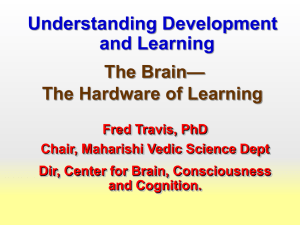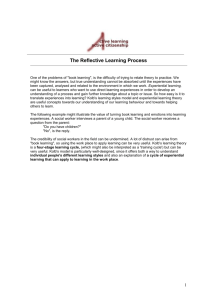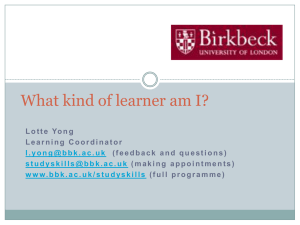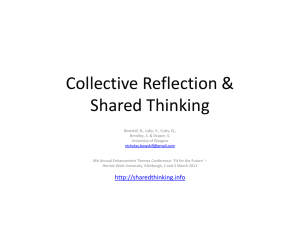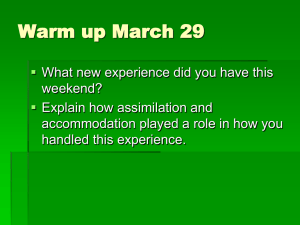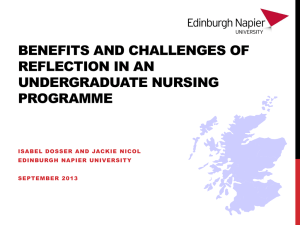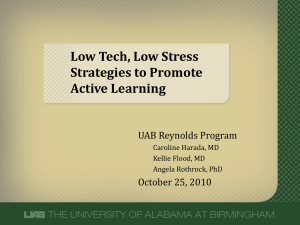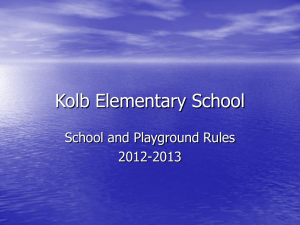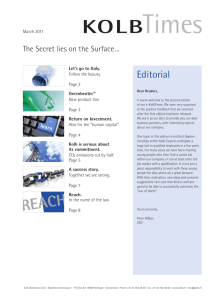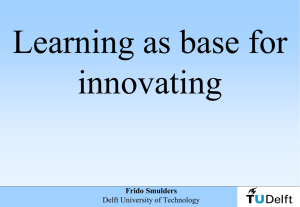178_14th_Oct_09_Kolb_Workshop
advertisement
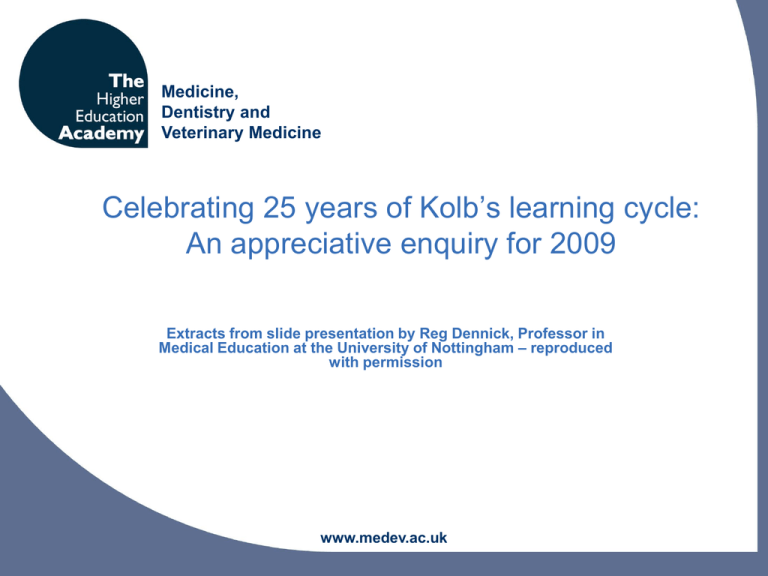
Medicine, Dentistry and Veterinary Medicine Celebrating 25 years of Kolb’s learning cycle: An appreciative enquiry for 2009 Extracts from slide presentation by Reg Dennick, Professor in Medical Education at the University of Nottingham – reproduced with permission www.medev.ac.uk Experiential Learning “Learning is the process whereby knowledge is created through the transformation of experience.” David Kolb Origins of the Kolb Cycle Dewey Lewin Piaget Importance of individual experience in learning How experience can be transformed into action Constructivist mechanism of learning: experience to abstraction Other influences on Kolb Vygotsky Experiential learning is a social process and is influenced by cultural tools. Jung Psychological types and learning styles. Individuation. Freire Experiential learning as liberating and leading to ‘critical consciousness’ The ‘Prehension’ dimension: modes of grasping experience Concrete Experience APPREHENSION: the tangible, felt qualities of immediate experience COMPREHENSION: conceptual interpretation and symbolic representations Abstract conceptualisation The ‘Transformation’ dimension: modes of processing experience EXTENSION: manipulation of the external world Active experimentation Reflective observation INTENTION: manipulation of the mental world Structural dimensions underlying the process of experiential learning and the resulting basic knowledge forms. (Kolb, 1984) Concrete experience Grasping by APPREHENSION Active experimentation Transformation by EXTENSION INTENSION Grasping by COMPREHENSION Abstract conceptualisation Reflective observation What shall I do? Outer world Reflection and action on inner world produces conjectures and hypotheses about outer world Reflection on outer world builds up inner model Inner world What does it mean? It’s not just a cycle! • All four learning modes are present to the learner simultaneously • The learner is constantly moving between the concrete and the abstract and between reflection and action. “…all forms of human adaptation (learning) approximate to scientific inquiry.” David Kolb 1984 Practical implications of Kolb’s cycle for learning • • • • • Getting round the cycle Appraisal & revalidation Mentoring Reflection Action planning Experiential learning lAll learning is learning from experience lWork-experience l‘On the job training’ lDoing the job & learning simultaneously lWorking independently lSelf-directed learning lSelf-monitoring lReflection lEducational & clinical supervision lMentoring lAppraisal Getting the experiences At each stage in the cycle, how can the learner optimise their learning? What stands in the way? What opportunities are there? Reflecting on experience • • • • Debriefing Getting feedback Critical incidents Self-evaluation Building up knowledge, skills & attitudes • • • • • Reading the literature Self-directed learning Recording knowledge Practising skills Developing attitudes Deciding on action • • • • • Personal development plans Action plans Personal objectives Feasibility Achievable? How does reflection help you learn? • • • • • • Experience is transformed into knowledge by reflection Reflection elaborates learning Reflection challenges assumptions Reflection helps relate theory to practice Feedback helps reflection Reflection can be guided via ‘professional conversations’ Personal & professional development: portfolio-based learning, appraisal/supervision • All based on and follow the Kolb cycle. • Experiences are recorded in Log-book/Portfolio • Reflections are recorded and/or facilitated by ‘professional conversation’ with mentor, supervisor. • Knowledge, skills and attitudes are built from experience plus reflection and connected to the literature and other knowledge tools. • Action plans for further experience are formulated via professional conversations. EXPERIENTIAL LEARNING: KEY PRINCIPLES 1.Have experiences 2. Reflect individually and/or with others 3. Be aware of your ‘learning style’ 3. Get and give feedback 4. Actively build mental models, practical skills and attitudes 5. Test hypotheses and action plan 6. Use Log Books & Portfolios to record experiences and reflect Criticisms of Kolb • It doesn’t stress the social dimension of learning: it focuses on the individual • Some learners do not learn from experience • Some learners do not reflect • Skills can be learned without thought • Ignores social dimension of learning The basic knowledge forms (Kolb, 1984) Concrete experience ACCOMMODATIVE knowledge ?? DIVERGENT knowledge ? ? Active experimentation ? ? CONVERGENT knowledge ? ? ? ? Reflective observation ASSIMILATIVE knowledge Abstract conceptualisation Doing things, carrying out plans and getting Imaginative ability and awareness of involved in new experiences. The individual meanings and values. View situations from adapts themselves to changing immediate many perspectives and attempt to see the circumstances. Problems are solved by trial and whole picture. Thinking generates alternative error often using other peoples knowledge. ideas and implications. Good at Theories are easily discarded and are subordinate brainstorming. Interested in people and their Concrete experience to practical facts. Individuals are at ease with feelings. people but are often seen as ‘pushy’. ACCOMMODATIVE knowledge Active experimentation CONVERGENT knowledge DIVERGENT knowledge Reflective observation ASSIMILATIVE knowledge Problem solving, decision making and the practical application of ideas. Thinking converges onto the solution of a question or Inductive reasoning and the creation of problem, using the hypothetico-deductive theoretical models by synthesising varied method. Orientated towards technical tasks observations into an integrated explanation. and problems rather than social or More concerned with logically sound abstract Abstract conceptualisation interpersonal issues. ideas than people. Doing things, carrying out plans and getting involved in new experiences. The individual adapts themselves to changing immediate circumstances. Problems are solved by trial and error often using other peoples knowledge. Theories are easily discarded and are subordinate to practical facts. Individuals are at ease with people but are often seen as ‘pushy’. Problem solving, decision making and the practical application of ideas. Thinking converges onto the solution of a question or problem, using the hypothetico-deductive method. Orientated towards technical tasks and problems rather than social or interpersonal issues. Imaginative ability and awareness of meanings and values. View situations from many perspectives and attempt to see the whole picture. Thinking generates alternative ideas and implications. Good at brainstorming. Interested in people and their feelings. Inductive reasoning and the creation of theoretical models by synthesising varied observations into an integrated explanation. More concerned with logically sound abstract ideas than people. involved, openHoney & Mumford Learning Get Styles minded, enthusiastic, Practical, love new things: ‘I’ll try experimental, down to anything once’ Activists earth: ‘There is always a better way’ Pragmatists Reflectors Look for principles, logical, perfectionist: ‘What are the basic assumptions’ Theorists Stand back, think, cautious: ‘Look before you leap’ H & M s c o r e s : 1 s t ye a r M e d ic s A c tiv is t 20 10 P ra g m a tis t 0 R e f le c to r 1 s t Y e a r M e d ic s S c ie n tis ts /e n g in e e rs T h e o ris t T&L Masters 2003 Pragmatist Activist 20 15 10 5 0 Theorist Reflector T&L Masters 2006 Masters T&L 06 Activist 20 15 10 5 Pragmatist 0 Theorist Reflector Deep Learning (Going round the cycle) Concrete experience Active experimentation Abstract conceptualisation Reflective Observation Surface Learning (short-circuit!) Concrete experience Active experimentation Abstract conceptualisation Reflective Observation Trial & Error? Concrete experience Active experimentation Abstract conceptualisation Reflective Observation As Kolb said….. Psychological categorizations of people such as those depicted by psychological ‘types’ can too easily become stereotypes that tend to trivialize human complexity and thus end up denying human individuality rather than characterizing it. In addition, type theories often have a static and fixed connotation to their descriptions of individuals, lending a fatalistic view of human change and development. – Kolb, Experiential Learning (1982) p 63 Constructive Experience: implications for teaching. 1.Acknowledge and respect the learner and start from where they are. 2.Ascertain, activate and build on their prior knowledge. 3.Provide appropriate active learning experiences of an individual and social nature. 4.Facilitate reflection and provide feedback. 5.Recognise the tentative nature of knowledge and encourage enquiry. 6.Encourage individual responsibility for exploration, selfdirected learning and action planning. 7.Develop a learning relationship, empathise.
